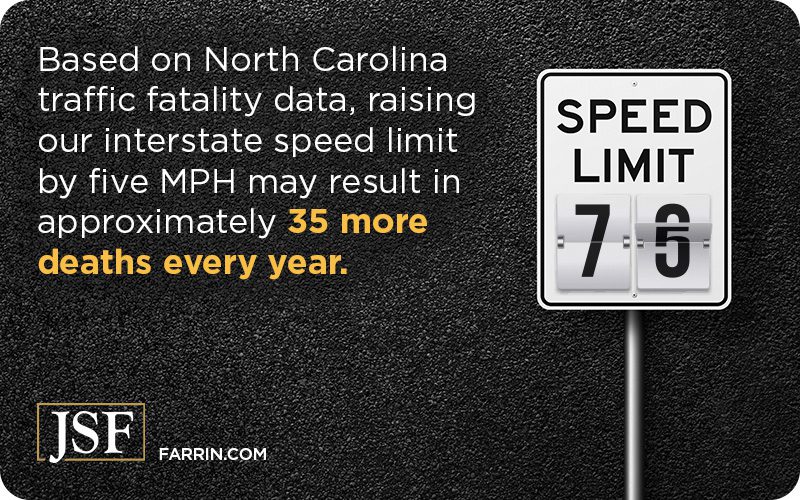North Carolina’s highways are among the deadliest in the U.S. and yet bills are continually proposed in the North Carolina legislature to raise the speed limit from 70 to 75 miles per hour on highways statewide. In my opinion, if these bills became law, it would lead to even more tragic deaths on our highways.
North Carolina is typically among the top 10 states with the most traffic deaths. In 2021, there were 1,783 people killed in traffic crashes on North Carolina roads, with 427 people dying due to excessive speed.
While supporters say that there are several benefits to raising the speed limit in North Carolina, like improving the economy, there’s strong evidence that increasing the speed limit will lead to more deaths.
Would Raising the Speed Limit Improve the Economy?
The economic benefits are overstated. Supporters tend to point to one study that found that raising the speed limit could have a limited beneficial economic impact. For example, commercial trucks might get to their destinations a bit more quickly.
However, the same study also found that the increased operating costs of driving cars at higher speeds nearly halved the economic benefits, while simultaneously increasing fatal crashes by 24%.
What Are the Risks Associated With Increased Speed?
Covid lockdown conditions show that crashes may become far deadlier when people have the opportunity to speed more.
In addition, the American Journal of Public Health, one of the most highly cited journals on public health, found a “3.2% increase in road fatalities attributable to the raised speed limits on all road types in the United States.” According to the study, “the highest increases were on rural interstates (9.1%) and urban interstates (4.0%).” In short, our highways will be less safe.
Do Higher Speed Limits Cause More Accidents?
Yes.
Supporters say cars are safer than ever, and speed limits should reflect this. However, the laws of physics haven’t changed.
Once you reach about 56 mph, your chances of surviving a crash without serious injury plummet. According to Dr. David Harkey, President of the Insurance Institute for Highway Safety (IIHS), “Higher speed limits cancel out the benefits of vehicle safety improvements like airbags and improved structural designs.”
What Is the Relationship Between the Speed Limit and Accidents?
According to the IIHS, increasing the speed limit on an interstate by just five MPH leads to an 8% increase in interstate deaths. Speed limit increases have resulted in almost 37,000 extra deaths in the past 25 years. Based on North Carolina traffic fatality data, raising our interstate speed limit by five MPH will result in approximately 35 more deaths every year.
Raising Speed Limits Will Increase Fatalities in Already Problematic Areas
Raising the speed limit will not have an equal effect on highways statewide and will exacerbate existing problems in areas of the state already dealing with high crash fatality rates.
For instance, Robeson County is one of the most dangerous counties for drivers according to the NCDOT. In 2021, Robeson had 63 fatal crashes and 1,208 non-fatal injury crashes. Raising speed limits in more rural areas will encourage speeders to push the boundaries even further. And for more congested regions, like Mecklenburg County, raising speed limits makes even less safety sense.
History repeating itself?
Sadly, we’ve been here before. In 1995, the NHS Act allowed states to set their own speed limits. Data from the National Highway Traffic Safety Administration shows that states which increased their speed limits in 1996 experienced approximately 350 more interstate fatalities, or 9% more than would have been expected.
The following year, North Carolina increased its interstate speed limit from 60 to 70 MPH and saw a 5.4% increase in interstate deaths, with interstate deaths accounting for 2.2% more traffic deaths overall than the previous year.
Is a jump from 70 to 75 MPH worth the extra deaths this time?
More people will die on our highways if we raise the speed limit in North Carolina, and, in my opinion, the purported benefits do not justify the risk to people. For the safety of North Carolinians, legislation allowing speed limits to be raised in our state must not be passed.
If you’ve been injured by a speeding or reckless driver, call 1-866-900-7078 for a free case evaluation
You May Also Be Interested In
Rural Road Accidents in North Carolina – Facts and Tips for Safe Travel





